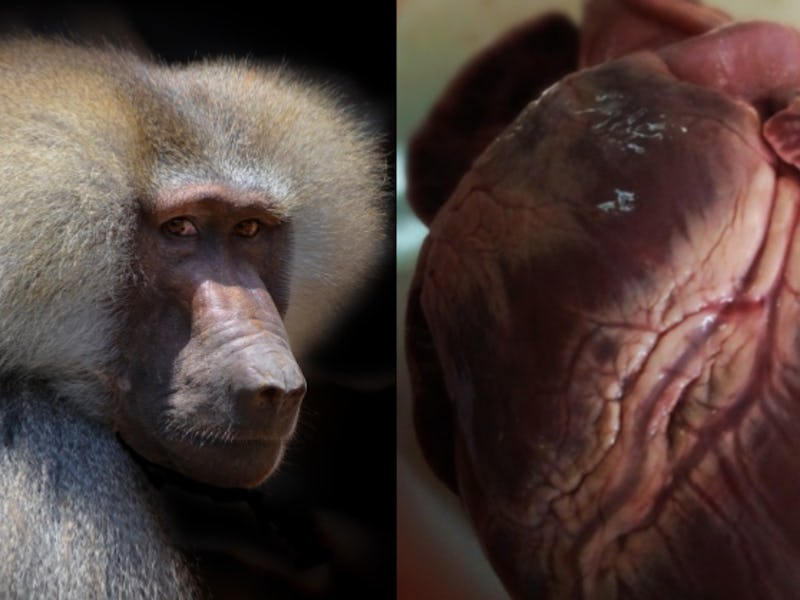Two Baboons With Pig Hearts Survived for an Unprecedentedly Long Time
"This is a very important achievement in the field of xenotransplantation."

Society is one step closer to a future in which humans have pig hearts, thanks to a landmark study published Wednesday in Nature. In the study, scientists report that two baboons survived for just over six months after receiving a heart transplant from a pig. Previously, baboons who had undergone the strange procedure only survived a maximum of 57 days.
Xenotransplantation — the transplantation of organs from one species to another — is a growing area of research because there simply aren’t enough human organs to transplant into human patients. Each day, ten Americans die while waiting for an organ transplant. The success of this baboon study suggests that humans might be able to survive this procedure as well.
“This is a very important achievement in the field of xenotransplantation in particular, and in the field of transplantation in general,” Muhammad Mohiuddin, M.D. tells Inverse. “We are losing hundreds of patients a month because we don’t have an organ to replace their diseased organ.”
Mohiuddin, who was not a part of this study, is the director of the Program in cardiac xenotransplantation at the University of Maryland and took part in a successful transplantation of a pig heart into a baboon abdomen for 945 days in 2016. The team behind the new study incorporated the drug therapy regime Mohiuddin’s team developed to keep the baboon’s body from rejecting the heart.
The field of pig heart xenotransplantation has been developed extensively over the past 25 years. This new study’s success can partially be chalked up to previous research that established the necessary immunosuppression protocol as well as the ability to genetically modify pigs so their hearts won’t trigger the immune systems of other animals after transplantation.
The authors also developed an optimized process for preserving pig hearts during transplantation: Instead of storing the hearts only in cold storage solution, the team intermittently pumped the hearts, which were stored at 46.4 degrees Fahrenheit, with a fluid solution that contained nutrients, hormones, oxygen, and red blood cells.
An early version of this procedure kept four baboons alive for 40 days, the team writes. Modifying the procedure, the team tried it again on five new baboons, who were additionally given drugs to prevent their transplanted piglet hearts from growing too large and medication that lowered their blood pressure to match that of their donors.
From this group of five emerged the two that would live a respective 195 and 183 days. Two others in the group survived for three months, while one died soon after the transplant.
A fetal pig heart.
These results make co-author and Ludwig Maximilian University of Munich professor Bruno Reichart, M.D. hopeful that clinical trials for humans can begin in about three years. In 2000, the International Society of Heart and Lung Transplantation suggested that human clinical trials could begin once 60 percent of primates — more specifically, at least 10 primates of those tested — given pig-hearts survived for at least three months.
Before this happens, a Nature commentary points out, we’ll need to learn more about the potential for porcine viruses to be transmitted from pigs to humans, and doctors will need to devise a protocol to determine whether a patient needs a pig-heart or a mechanical support device.
Mohiuddin’s team is already doing similar experiments to replicate the new findings in hopes they will help bolster support for clinical trials, which the FDA has the power to approve.
“These [new] results provide hope to thousands of people around the world who are waiting for heart transplants,” Mohiuddin says. “The German group deserves a big hand of applause for this remarkable work.”